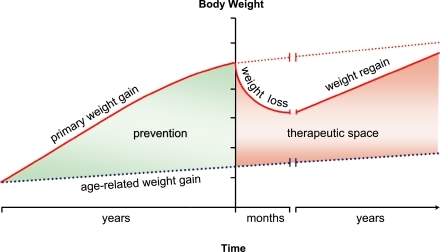
Is Weight Loss Overrated?
With all the energy and money that goes into it, we wonder, is weight loss overrated? Could it be that long-term weight maintenance strategies are much more important?
 Certainly, weight maintenance seems to be the biggest challenge if you look at the natural progression of obesity and its treatment over time. By comparison, weight loss is pretty straightforward and quick.
Certainly, weight maintenance seems to be the biggest challenge if you look at the natural progression of obesity and its treatment over time. By comparison, weight loss is pretty straightforward and quick.
Non-surgical weight loss can reliably produce a 5-10% reduction in weight using the tools of dietary and behavioral modification. Surgical weight loss yields bigger numbers. Both methods produce significant benefits in health and quality of life.
And regardless of the means for weight loss, it happens pretty quickly — in a matter of months. Primary weight gain and the regain of weight is a much slower process than weight loss — a matter of years. And so it is that weight loss is really a pretty small part of the process of managing the chronic disease of obesity. Maintaining weight loss — that is preventing weight gain — is where the real challenge lies.
Two giants of obesity research, Tom Wadden and George Bray, discuss the challenges of improving long-term weight maintenance in a commentary just published in Obesity. Their commentary accompanies a comprehensive report on what’s known about weight maintenance and the challenges that remain, commissioned by the National Institutes of Health (NIH).
The primary behavioral challenges for weight maintenance are adherence, individual variability, and study methods. It’s tough to stick with a program for the long term — life gets in the way. Everybody needs something different and responds differently. And these challenges make designing a long-term study devilishly hard.
The physiological challenges for weight maintenance are metabolic adaptation, individual variability, and gaps between animal and human research in weight maintenance. Profound physiological changes happen after weight loss that almost ensure the regain of weight. Though it’s very different from person to person, the result is a consistent bias to return to a higher weight. And despite considerable progress in understanding weight regain in animals, translating those insights into human condition has been tough.
Losing weight — a little or a lot — has limited value if we neglect strategies for maintaining the benefit in the long term. Weight loss is a sprint. Defeating obesity is a marathon.
Click here to read the commentary from Bray and Wadden. Click here to read the NIH working group report.
Motivation Marbles, photograph © Melanie Levi / flickr
Subscribe by email to follow the accumulating evidence and observations that shape our view of health, obesity, and policy.
